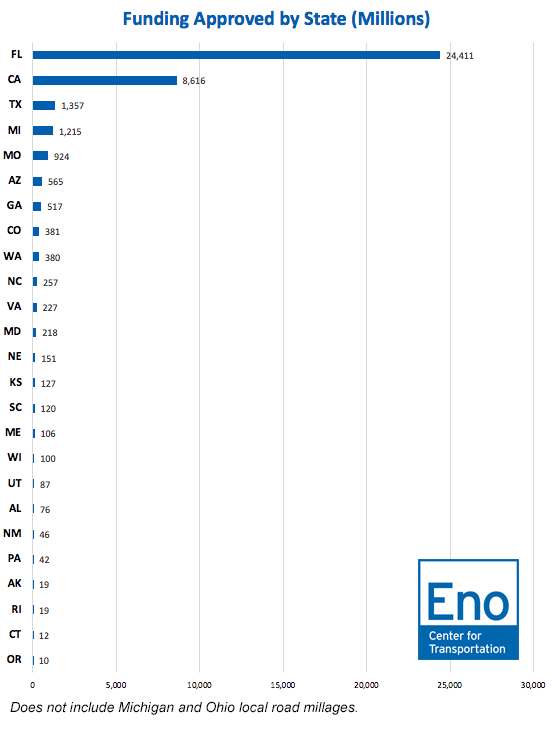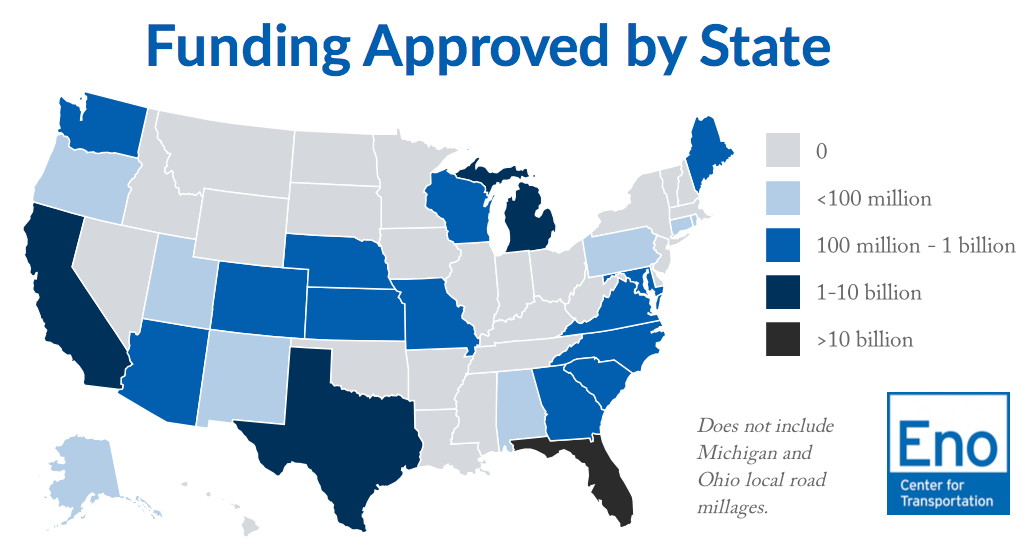November 27, 2018
Voters in Florida approved far more funding for transportation at the ballot box this year than voters in any other state, according to Eno’s ongoing analysis of the 2018 transportation ballot measures.
The vast majority of the $24.411 billion approved by Florida voters came in the form of two penny sales tax increases passed in Broward County ($15.63 billion) and Hillsborough County ($8.28 billion). Together, those account for about 98 percent of transportation funding approved by Florida voters this year. (Much of that money will go toward transit and multimodal projects; click here to see how different transportation modes fared at the ballot box this year.)
California came in a distant second place, with just over $8.6 billion approved for transportation. The largest chunk of this was passed not on Election Day, but back in June, when a nine-county region in the Bay Area approved Measure 3 to raise $4.5 billion in tolls for traffic relief and public transit. San Mateo County’s Measure W also scraped by with a win (receiving 66.85 percent approval, just above the two-thirds threshold), which will raise the sales tax to invest $2.4 billion in general transportation improvements.

It is important to note that of the $39.7 billion approved for transportation this year, only $811 million of it was approved in statewide measures. Maine voters approved $106 million in bonds for transportation improvements; Rhode Island voters approved $5 million in bonds for its State Bikeway Development Program; and Michigan will contribute $700 million of its marijuana excise tax revenue to road improvements. All of the rest was approved at the regional, county, or municipal level. Looking at state-level data can help show the geographic dispersement of voter-approved transportation funding but should not be taken to mean everyone in those state will see the benefits of that money equally.
These numbers also do not include the 300+ local road millages that went before voters in Michigan and Ohio; the vast majority of those are routine renewals of existing property tax levies and are thus not additive. Even so, while most of these millages passed, they raise relatively small amounts of money and would not change the total state-wide numbers much (though would put Ohio on the map).
Looking at a map of where voters supported raising money for transportation shows no real pattern, with voters in just about every region approving transportation ballot measures. One exception is the north-central United States, where no funding was approved. There was only one measure each in North Dakota and Idaho – both sales tax increases that failed – and none in South Dakota, Montana, or Idaho. The Northeast, where voter initiatives are not as commonplace as they have historically been out West, also did not see many transportation ballot measures this year, though Maine voters approved a $106 million bond measure and Connecticut voted to put its Special Transportation Fund in a lockbox.

Eno continues to analyze the results of the 2018 transportation ballot measures. Check back at Transportation at the Ballot Box often to see the latest, and follow us on Twitter @EnoTrans to stay updated.





